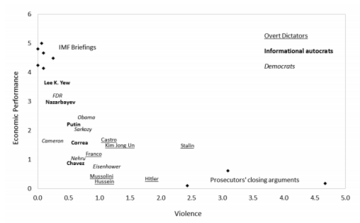
Through the years, the goal of non-democratic leaders has remained the same – to concentrate power in their hands. Until recently they employed mass violence, ideological indoctrination, and closed borders, among other tactics, to monopolise power. Yet, in recent decades, a major shift in the strategy on how to establish and maintain such systems has occurred. Unlike past totalitarian systems, authoritarian leaders of today distort information flows in order to boost their popularity and maintain their power.
The strategy exploits the gap in political knowledge between the “informed elite” and the general public. Namely, for authoritarian leaders to successfully consolidate their power whilst mimicking democracy, they need the “informed elite” to convince the citizens that they are competent and benevolent. In doing this they buy elite’s silence, censor or co-opt private media, and broadcast propaganda about their competences and success. By doing this they create a parallel reality in which citizens do not realise they are being held down.
The reasons for this shift in the strategies of authoritarian leaders are complex. Economic modernisation and spread of higher education make it harder for authoritarian leaders to control the public by means of crude repression. Also, several other factors are highlighted by the authors. Also the decline in the appeal of authoritarian ideologies since the end of the Cold War has weakened old models of autocracy, then the global human rights movement and new information technologies have raised the cost of visible repression, among other factors.
Using newly collected data, Professors Guriev and Treisman documented several key factors in modern autocratic systems that support their theory:
- There is a noticeable decrease in violence in informational autocracies as a result of the strategy to control the public by manipulating information rather than through brutal force.
- Also, contrary to the previous practices when many autocrats publicised their brutality to deter opposition or energise supporters, informational autocrats use various tricks to conceal state repression.
- Unlike their counterparts in the past, informational autocrats reject official ideologies. Namely, they are or can be critical of the West and its liberal values, but rarely reject democracy per se.
- Imitation of democracy is another key element of modern autocrats. Instead of banning opposition parties, they use other methods like harassing candidates and manipulating the media to ensure large victories. Analysing speeches of different types of leaders, authors found evidence that modern autocrats focus on rhetoric of performance rather than violence.
- Also, in convincing ordinary citizens to continue to think that the incumbent is competent, informational autocracies rely heavily on the perception gap between masses and elite.
The content of this article can be used according to the terms of Creative Commons: Attribution-NonCommercial 4.0 International (CC BY-NC 4.0) . To do so use the the wording "this article was originally published on the Resource Centre on Media Freedom in Europe" including a direct active link to the original article page.

